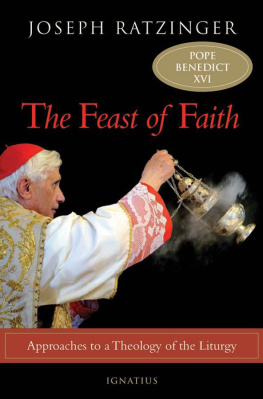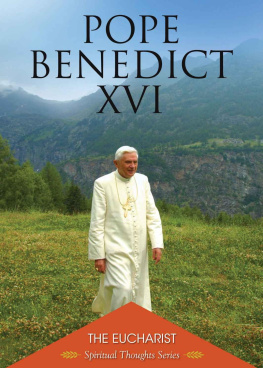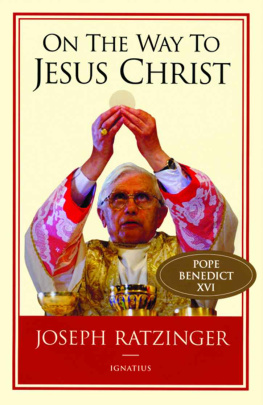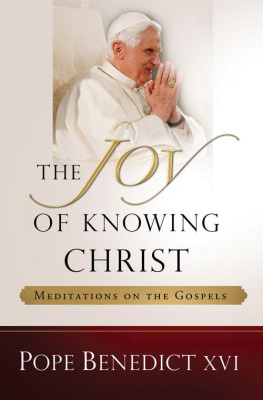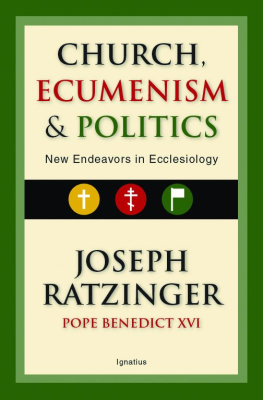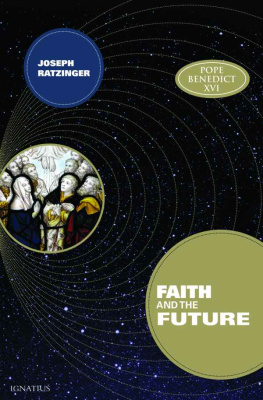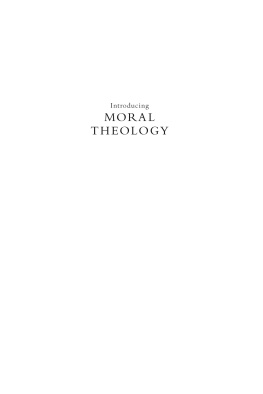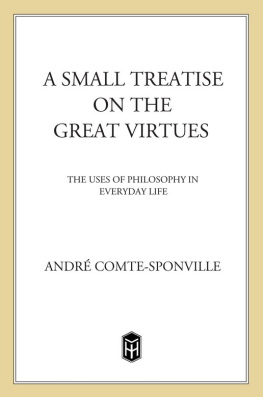Regarding Faith , anyone who has followed Benedicts preaching and writings is aware that his primary pastoral concern has been to open wide before all the horizon of God and the awareness of the primacy of God in life for a good and happy existence for individuals and for the building up of a society worthy of man.
Hope is the great portal of faith. Hope for the Christian does not mean a generic desiring and waiting for something that one wants to happen but it means to experience already today as joy and peace the promise that will be realised fully in the great day of the Lord.
In Charity , finally, everything is summed up and enlightens. Side by side with the theological virtues, other virtues support the Christian in his effort to conduct a virtuous life. There are four cardinal virtues (prudence, justice, fortitude, temperance) and there are other virtues as well that are necessary for ones interior purification and spiritual progress.
These are great tapestries of the theology and spirituality of Benedict XVI.
CONTENTS
PREFACE
The three theological virtues faith, hope and charity make up one of the great tapestries of the theology and spirituality of Benedict XVI.
Regarding faith, anyone who has followed Benedicts preaching and writings is aware that his primary pastoral concern has been to open wide before all the horizon of God: the awareness of the primacy of God in life for a good and happy existence, for individuals and for the building up of a society worthy of humankind.
Furthermore those who have tracked his writings and preaching will be aware that faith has been studied by Benedict in depth under all aspects: as search for meaning and truth, in a fruitful rapport of collaboration with reason; as knowledge of the Word of God, of doctrine and of the tradition of the Church; as personal encounter with Christ and experience of communion with all believers; as announcement and witness to others of the truths one believes; as commitment to education and permanent formation, in renewing and spiritually perfecting oneself as the premise of every authentic evangelization of others. In short, faith examined in its theological foundation and in the dynamism of its existential reality: a faith that is sought, thought about and lived.
In its close link with the other virtues, faith is the font of the inexhaustible love that proceeds from God and becomes incarnate in history ( Deus caritas est, 2005); it is the great hope that illumines the present and projects into the future ( Spe salvi, 2007); the driving force of love in truth ( Caritas in veritate, 2009). Each of the virtues receives nourishment from the others and operates by means of the others. Faith is the beginning of all and therefore also the source of the other virtues. But if faith itself is not spurred on by hope and not fed by charity, it does not walk or it walks in vain. Hence, all three theological virtues are necessary and inseparable, related to one another and to the cardinal virtues, together forming the many faces of the one love with which God, in Christ, reveals himself to humanity and by which men and women meet God, the supreme Love and therefore also the greatest happiness. Not by chance does the circle of the virtues close with love, the supreme virtue, because not only is it the compendium of all the other virtues, and hence also the essence and the measure of Christian perfection, but also because charity is the goal that must be reached by every thought and effort of the human being, inspired by grace.
The complex of these concepts and themes are intertwined and articulated in the reflection of Benedict XVI, who always draws out concrete theological and catechetical wisdom in the interpretation and meditation of the Word of God. Following the thread of the Scriptures, Benedict XVI in fact picks up the roots and links of the three virtues in a circular path where faith, hope and charity always meet each other, to walk together towards the ultimate truth which gives meaning and light to the journey of every human being. Faith is precisely this response of truth that is glimpsed at the moment wherein God is not anymore a mirage, or appearing on the horizon as a distant God, but as a God who makes himself present, who little by little one learns to know and with whom one enters into friendship. Then, after this discovery and assent, comes what the experience itself of life teaches, namely the difficulty of remaining steadfast in fidelity to Gods word and of having ones heart always open to love. That what is lost, due to betrayal or weakness, is full adhesion to the living God, complete entrustment to Christ, in the total choice of living in him so as to walk with him toward eternal life: which is not only the life that will come at the end of the earthly pilgrimage, after one has passed through the narrow door, but the true life, which can be won even here, in the measure that one is capable of remaining attached to Christ who is Life. In the figure of Mary assumed into heaven body and soul, there is the sublime icon of eternity, the reality of a life that no physical death will ever be able to cancel, because it lives in full and perfect communion with God.
Hope is the great portal of faith. Hope for the Christian does not mean a generic desiring and waiting for something that one wants to happen as in reality every human being hopes, because no one can live without hope. It means, in fact, to experience already today as joy and peace the promise that will be realized fully in the great day of the Lord, assuming consciously the inheritance received in Jesus, our hope (1 Tim 1:1) because it is the hope in which we have been saved. This is what Benedict XVI calls to our attention starting from the title of his encyclical ( Spe salvi ), quoting Paul (Rom 8:24). Without this great hope, it is difficult to believe in small human hopes; on the contrary, there is the risk of falling under the shock waves of sufferings, of limitations and of delusions, in a destructive nihilism that corrodes every hope, making one to believe definitively that he or she is at the mercy of nothingness, before birth and after death. Without faith, where hope is indelibly written, everything is lost; with faith, every horizon, whether of the present or the future, opens. And even if hope does not eliminate tensions and sorrows, even stronger is the consoling certainty that what has been promised will be realized, namely adoption as children of God and eternal glory in his Kingdom. From this is born the courage and the perseverance to act, precisely because Christian hope as was said is not summed up in a simple waiting. Rather, exactly because it is rooted in the power of the God of hope (Rom 15:13) it spurs us on to operate actively, with the objective of transforming the world according to the principles of love, justice and fraternity that are the natural reflection of one who follows Christ and brings his hope as newness of life and salvation. The nourishment and the perennial support of this hope lies in prayer: the guarantee that one will not be imprisoned in the narrow confines of ones self, but will always remain open to the boundless spaces of the reality of God.
In charity, finally, everything is summed up and enlightens. Because if the essence of God is love according to the famous affirmation of John (God is love, 1 Jn 4:8-16) so even in Christians God cannot but be present and manifest himself as the totality of love love for God and for Christ and, as a natural extension, love of neighbour, since only one who loves his brothers and sisters offers the tangible sign of his belonging to God and of witnessing to Christ. The more one grows and remains in the love of God and in the imitation of Christ, the more one becomes capable of going out to others. Not only towards his neighbours (family, community, group...), but towards all, because Christian love is universal, unconditional and goes beyond all barriers, divisions and prejudices. Thus conceived, charity also becomes an extraordinary force at the service of good and of justice, and it will always be necessary, even in the most just society, because no social order can render superfluous the service of love, which embraces man in his entirety, well beyond his material needs. Thus is the world regenerated by the charity of Christ which is spread in turn by Christians as the inalienable, permanent and universal commitment of their mission.


